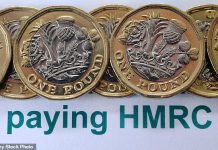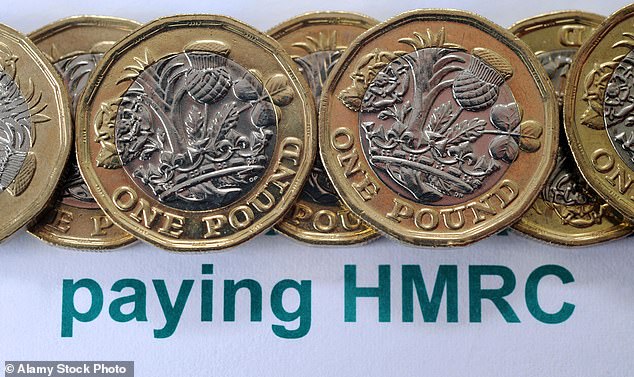How does HMRC calculate the amount of tax on savings interest from a joint savings account?
We are a married couple, one of us receives an NHS defined contribution pension of £42,800 per annum and both of us will soon receive our state pension.
We have no other income and draw all our income from savings. Neither of us have had to submit self-assessment tax returns.
Helen Kirrane of This is Money replies: You’re right to be wondering about the tax you could pay on your savings interest.
Four times as many people will pay tax on their savings this year compared with 2021-22.
Some 2.64million will be stung by tax on the interest they earn in their savings accounts in 2025-26, according to figures HM Revenue & Customs.
Some £2.5billion of this will arrive from pensioners as frozen thresholds drag more households into the net.
The savings tax burden for those over 65 years old is set to soar 215 per cent this financial year when compared with the savings tax haul from 2022-23.

Pensioners are set to pay £2.5bn in savings tax this year as frozen thresholds drag more households into the net
For expert advice on how HMRC knows whether you’ve breached your personal savings allowances as a couple, I spoke to April Leeson, Independent Financial Adviser at advisory firm The Private Office and Shaun Moore, tax and financial planning expert at wealth management firm Quilter.
April Leeson replies: When you earn interest from a joint savings account, HMRC simply splits it down the middle. Each of you is taxed on half, and that tax depends on your own rate of income tax.
That means if one of you pays less tax, you might save money by holding more of the savings in their name.
In your case, it could make sense for the spouse without the NHS pension to hold more of the currently joint savings in their own name.
Before you start to pay tax on your savings interest, you both receive a Personal Savings Allowance (PSA).
Basic-rate taxpayers can earn £1,000 in savings interest before paying tax and for higher rate taxpayers, this allowance drops to £500 a year.
Based on the limited information we have, the spouse in receipt of the NHS pension will get their interest taxed at 20 per cent or 40 per cent once they have utilised their PSA – their tax rate depends on whether the NHS income quoted is net or gross – and how much savings interest they receive.
It would appear that spouse with no income will have the £1,000 PSA and until the state pension starts, they could also benefit from the stating rate for savings of £5,000 per annum.
And, depending on how much state pension they receive going forward, they could well still have some or all of this allowance in the future.
HMRC usually collects any tax on savings interest automatically by adjusting your tax code if you are on the PAYE scheme.
In this case you don’t need to do anything for this to happen, as banks report the interest directly to HMRC.
If you want to keep your savings in cash, using Isas is the simplest way to avoid tax on interest altogether.
Each of you can put up to £20,000 a year into a cash Isa, and any interest earned inside it will be tax-free. Ideally, most of your savings could be sheltered this way.
Anything left outside Isas, you may want to consider keeping it in the name of the lower taxpayer, in order to be as tax efficient as possible.
Shaun Moore replies: ‘HMRC will generally assume that any interest earned on joint savings held by spouses or civil partners is split equally, regardless of who contributed the funds.
This means that each partner is taxed on half of the total interest received from the account at their own marginal tax rate.
However, if your beneficial entitlement to the interest is not 50/50 – for example if one partner receives 75 per cent of the interest and the other receives 25 per cent, you may be taxed on your actual entitlement, but you will need to be able to provide supporting evidence that this really is the case.
In your case, as one spouse is receiving a pension income of £42,800 and will soon receive the state pension which is likely to push them into the higher rate income tax bracket, they may need to pay the higher rate of tax on the interest earned.
Comparatively, as the other spouse has no income currently and will only receive the state pension, which is currently £11,973 per year if you are receiving the full new state pension, then they will be able to utilise the full starting rate for savings which allows you to earn up to £5,000 in savings interest without being taxed.
It is important to remember that each of you is entitled to a personal savings allowance which is £1,000 for basic rate taxpayers and £500 for higher-rate taxpayers.
This is on top of the starting rate for savings, so the lower earning spouse could earn up to £6,000 in savings interest before paying tax, after which it would be payable at the basic rate.
If the higher earning spouse’s share of the savings interest exceeds this £500 allowance, tax may be due.
If it is, then it would likely be much more tax efficient as a couple for the lower earning spouse to receive the full amount of interest, but this would need to be formally decided and evidenced.
An alternative could be to hold the savings account solely in the name of the lower income spouse. This provides a simple solution, but both parties would need to feel comfortable with the change in ownership of the savings.
SAVE MONEY, MAKE MONEY

Sipp cashback

Sipp cashback
£200 when you deposit or transfer £15,000
4.38% cash Isa
4.38% cash Isa
Trading 212: 0.53% fixed 12-month bonus

£20 off motoring

£20 off motoring
This is Money Motoring Club voucher

Up to £100 free share

Up to £100 free share
Get a free share worth £10 to £100

No fees on 30 funds

No fees on 30 funds
Potentially zero-fee investing in an Isa or Sipp
Affiliate links: If you take out a product This is Money may earn a commission. These deals are chosen by our editorial team, as we think they are worth highlighting. This does not affect our editorial independence. Terms and conditions apply on all offers.
#HMRC #calculate #tax #savings #interest #earned #joint #account
















